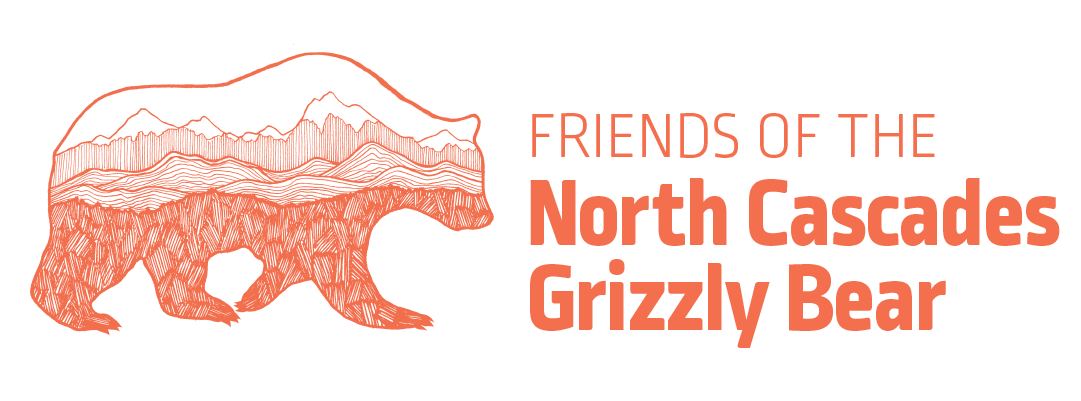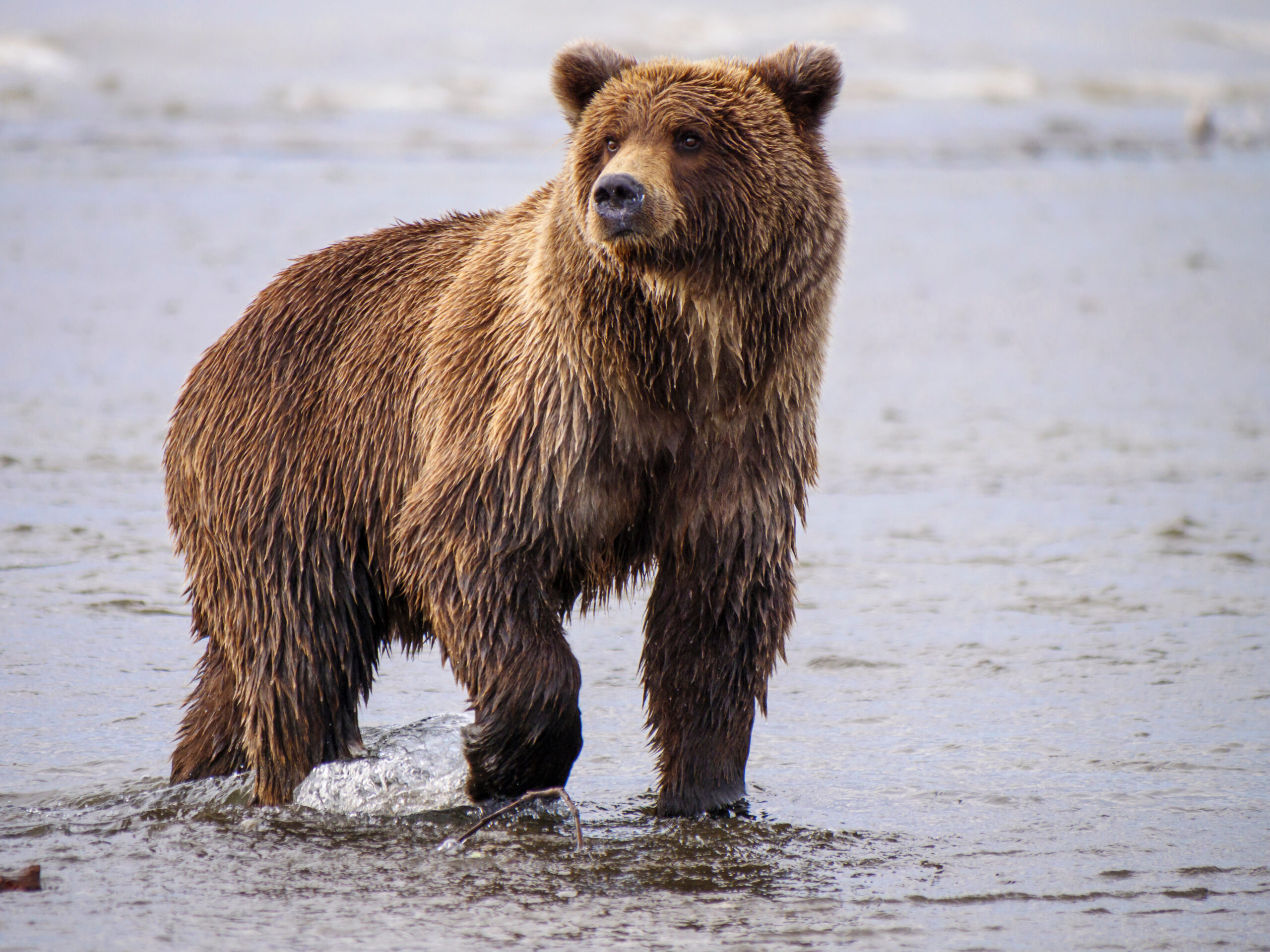March 21, 2024 – The Friends of the North Cascades Grizzly Bear coalition celebrates today as federal agencies announced their preference to bring grizzly bears back to the North Cascades Ecosystem.
The National Park Service and U.S. Fish and Wildlife Service have announced the Final Environmental Impact Statement and grizzly bear reintroduction plan. Although a record of decision has yet to be signed, the agencies’ preferred alternative would restore grizzlies to their historic homelands, where they are functionally extinct. The agencies recommend a 10(j) rule that would give wildlife managers additional flexibility under the Endangered Species Act to responsibly manage bears. The decision recommends a 10(j) rule that would give agencies flexibility under the Endangered Species Act to responsibly manage bears.
“After years of advocacy the Upper Skagit Tribe looks forward to the day the great bear returns to the rugged North Cascades which our people previously shared with Grizzlies for thousands of years,” said Scott Schuyler, policy representative for the Upper Skagit Tribe, whose territory lies within the recovery zone. “We thank leaders at the National Park Service, U.S. Fish and Wildlife Service, and Department of Interior for their intention to restore a cultural icon in the North Cascades.”
The North Cascades Ecosystem holds one of the most remote and rugged mountain ranges in the country. It is one of only two grizzly bear recovery zones without an established population. The area is one of North America’s premier intact ecosystems and features optimal habitat for grizzlies. However, the last confirmed sighting of a grizzly bear was in 1996. Habitat fragmentation and the low numbers of grizzlies in nearby populations make it highly unlikely that grizzlies would naturally recover in this area.
Under the preferred alternative, agency biologists would translocate a few bears from healthy source populations into the North Cascades over several years until an initial population of 25 is reached.
“The Snoqualmie Tribe is excited to hear this news, and to know that this hard-fought effort to bring home grizzlies is close to becoming a reality,” said Snoqualmie Indian Tribe Tribal Chairman Robert M. de los Angeles. “This is a critical moment in history, with governments, organizations, and individuals working together to welcome grizzlies back after human action removed them from their home. Snoqualmie thanks the leadership of our Congressional Leaders, the National Park Service, US Fish & Wildlife Service, and the Department of Interior for their persistent work and advocacy.”
For years, advocates in Washington state and beyond have weighed in supporting efforts to help the declining population of grizzlies and reintroduce bears to their historic habitat. A recent poll shows that 85% of Americans support grizzly restoration in the North Cascades. The designation of the North Cascades grizzlies as an “experimental population” has helped the effort gain support, as people have been assured that the bears will be gradually reintroduced and carefully managed.
“The agencies have shown that they are listening to local communities like ours by including necessary management flexibility for a successful reintroduction effort in the long run,” said Jasmine Minbashian, executive director of Methow Valley Citizens Council. “In eastern Washington, human-bear coexistence initiatives are already in progress. With the right resources focused on bear-smart infrastructure and education, rural communities can be a proud partner in the triumphant return of our majestic grizzly bears.”
A final Record of Decision will be signed following a legally mandated 30-day waiting period.
Quotes
“Finally, there is hope to see grizzly bears again in this wild landscape,” said Kathleen Callaghy, Northwest representative for Defenders of Wildlife. “We are deeply grateful to Secretary Haaland, Director Sams, Director Williams, and our legislative allies for showing collaboration and partnership at its best for the sake of conservation. Today is a day to be proud.”
“I can’t think of better news to usher in the promise of Spring than this historic step toward restoring grizzly bears to the North Cascades,” said Paula MacKay, carnivore conservation specialist with Woodland Park Zoo. “As we await the final Record of Decision, the zoo is poised to promote the long-term coexistence of thriving human communities and a healthy grizzly bear population.”
“We applaud the National Park Service and the U.S. Fish & Wildlife Service for deciding to actively restore grizzly bears to North Cascades,” said Susan Holmes, executive director of the Endangered Species Coalition. “As a keystone species, grizzly bears play an important role in the ecology of their habitat, and we are excited for their pending return to a place where they have too long been absent.”
“Today we celebrate our national parks as places where wildlife thrives and ecosystems are made whole,” said Theresa Pierno, president and CEO of the National Parks Conservation Association. “For years, NPCA has worked tirelessly to bring grizzlies back to their historic homeland. The return of the grizzly bear to North Cascades National Park is a symbol of the power of perseverance.”
“The grizzly bear is a critical part of the ecological and cultural fabric of the North Cascades. They belong here. Without them, our wild areas are diminished, less diverse, and sanitized. The narrative about Cascades grizzly bear recovery will take decades to unfold. But with science, education, and a little human tolerance, it can be one of the greatest conservation success stories of ours and future generations,” said Joe Scott, international program director for Conservation Northwest.
Press Contacts
Woodland Park Zoo: Paula MacKay paula.mackay@zoo.org; Robert Long robert.long@zoo.org
National Parks Conservation Association: Caitlyn Buford cburford@npca.org 541-371-6452
Defenders of Wildlife: Jacqueline Covey jcovey@defenders.org, 630-427-7164
Conservation Northwest: Andrea Wolf-Buck, andrea@conservationnw.org, 510-295-3579
###
About Friends of the North Cascades Grizzly Bear: Friends of the North Cascades Grizzly Bear is an independent partnership supporting the restoration of a healthy and functioning grizzly bear population in the North Cascades Ecosystem. Supportive resolutions, testimonials, frequently asked questions, resources and helpful links, bear safety information, and more are available on our website. More than two dozen Supporting Organizations and Businesses and over 2,500 Supporting Individuals have signed
on as Friends of the North Cascades Grizzly Bear. Steering Committee organizations for this collaborative effort include Conservation Northwest, National Parks Conservation Association, Woodland Park Zoo, Defenders of Wildlife, Northwest Trek Wildlife Park, and the National Wildlife Federation.
About Conservation Northwest: “Keeping the Northwest wild” since 1989, Conservation Northwest is a regional non-profit organization that protects, connects, and restores wildlands and wildlife from the Washington Coast to the British Columbia Rockies. The staff operates in local communities and rural areas around Washington and into southern B.C., using dialogue to find common ground and collaborative solutions for challenging issues including habitat corridors, wilderness conservation, forest restoration, and endangered species recovery. Visit www.conservationnw.org
About Defenders of Wildlife: For 75 years, Defenders has fought to protect all native animals and plants in their natural communities. With a nationwide network of nearly 2.2 million members and activists, Defenders of Wildlife is a leading advocate for innovative solutions to safeguard our wildlife heritage for generations to come. For more information, visit defenders.org/newsroom and follow us on Twitter @Defenders.
About the National Parks Conservation Association: Since 1919, the nonpartisan National Parks Conservation Association has been the leading voice in safeguarding our national parks. NPCA and its more than 1.6 million members and supporters work together to protect and preserve our nation’s most iconic and inspirational places for future generations. For more information, visit www.npca.org.
About Woodland Park Zoo: Founded in 1899, Woodland Park Zoo annually engages more than a million visitors of all ages, backgrounds, abilities, and walks of life in extraordinary experiences with animals, inspiring them to make conservation a priority in their lives. The zoo is helping to save animals and their habitats in the wild through more than 35 wildlife conservation projects in the Pacific Northwest and around the world. Woodland Park Zoo is accredited by the Association of Zoos & Aquariums and certified by the rigorous American Humane Conservation program. The Humane Certified™ seal of approval is another important validation of the zoo’s long-standing tradition of meeting the highest standards in animal welfare. Visit www.zoo.org.


